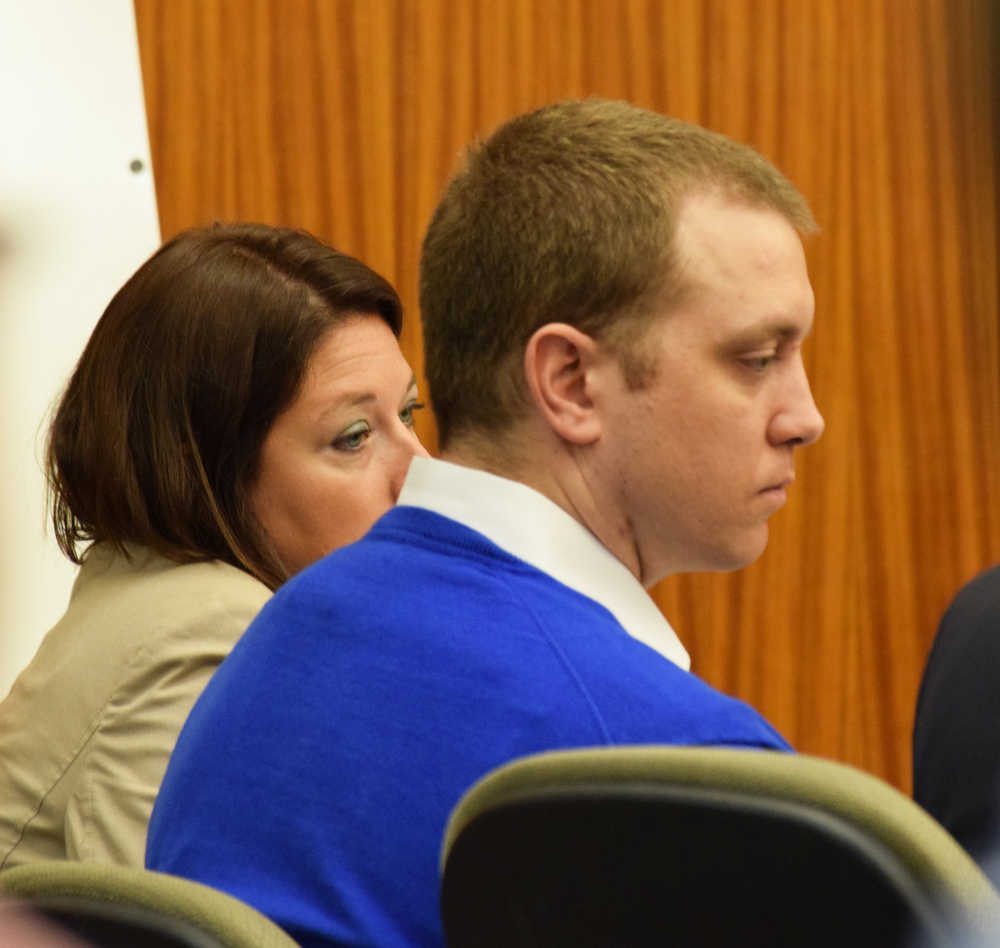Editor’s note: This story has been updated to correct the day the sentence was handed down.
Paul Vermillion, a 33-year-old man from Anchorage, has been sentenced to 10 years in prison for manslaughter in the 2013 death of 27-year-old Genghis Muskox that occurred in Cooper Landing.
The Iraq War veteran originally faced charges of murder in the first and second degrees as well, but pleaded guilty to one count of manslaughter, a class A felony, as part of a plea agreement in April. The two men were said to be friends who got into a fight on Dec. 5, 2013 after drinking, which ended with Muskox being hit first with an ice axe and then shot twice in the head.
Kenai Superior Court Judge Charles Huguelet handed down a sentence of 20 years in prison with 10 years suspended and five years of probation Thursday at the close of a three-day sentencing hearing at the Kenai Courthouse. District Attorney Scot Leaders and defense attorney Andrew Lambert made their final arguments in regard to sentencing Thursday, with Leaders asking for the heaviest possible sentence of 11 years of active jail time, per the agreement.
After the hearing, Lambert said he thought the outcome was very fair and that Huguelet had done a good job of listening to the arguments. Leaders said he had nothing to add past what he had said in court. During his final arguments, Leaders maintained that Vermillion had intended to kill Muskox, against Lambert’s arguments that it was done in self-defense.
“The fact of the situation is that there’s only two people that know exactly what happened in that residence that night,” Leaders said. “Unfortunately, Mr. Genghis Muskox isn’t here to tell us about what happened.”
Leaders said the plea agreement for manslaughter was reached because the state realized there would be risk in going to trial. He said when additional information about the Cooper Landing crime scene came out through the reports of two crime scene reconstructionists for the state and defense, the state was faced with not being able to prove who started the fight or first introduced a gun into the fight. This presented the risk of acquittal at a trial, Leaders said. October testimony from an investigator with the Alaska Bureau of Investigations conflicted with the findings of a crime scene reconstructionist called during the sentencing hearing for the defense, which Lambert had previously said were more supportive of his self-defense theory.
“As we got the reports from those (experts) additional things came into consideration, the state recognized that while the state’s theory — we still maintain our theory that this act was an intentional killing on the part of Mr. Vermillion, there were those risks of going to trial,” Leaders said.
In handing down the sentence, Huguelet said he took Leaders’ judgement into consideration.
“If he believes this was the right thing to do, it’s hard for me to second guess it and put the community to the price of paying for a trial and possibly losing it,” Huguelet said.
Vermillion will get credit for the time he has already served and the time he spent outside of jail on an ankle monitor, which Huguelet said was from Jan. 22, 2014 to April 7, 2016.
In addition to jail time and supervised probation, Huguelet ordered restitution in an amount to be determined at a later date. The state has 90 days to file for it. Huguelet also gave special conditions that while on probation Vermillion not have or consume any alcohol or use any drugs, and that he must complete a substance abuse evaluation, a mental health evaluation and an anger management counseling and violence rehabilitation program once released.
“The alcohol, yeah, I agree with Dr. Mundt (an expert witness), you should never swallow another drop of alcohol in your life,” Huguelet said to Vermillion.
Huguelet included in the sentencing a recommendation that, if possible, Vermillion be given furlough to be in a treatment program while still serving his sentence.
“People do stupid things when they take drugs — taking drugs is a stupid thing in itself,” Huguelet said. “People do stupid things when they drink and we hold them accountable in the state of Alaska. It’s not a defense to crimes to say ‘I was drunk.’ it’s not a defense to immoral acts. We hold people accountable but we need to understand that drunkenness and alcoholism is something that we need to work with when a person is rehabilitating, and I think the potential for rehabilitation in Mr. Vermillion’s case is higher than most I see.”
During his expert testimony, Dr. John Mundt, who works for the Department of Veterans Affairs in Chicago, said Vermillion has been under-treated since returning from war and that the effects of his post-traumatic stress disorder and traumatic brain injury would greatly improve through consistent treatment. During his final arguments, Lambert stressed that Vermillion will not get adequate treatment in jail.
“He needs intensive psychotherapy for (post-traumatic stress disorder) and (traumatic brain injury,)” Lambert said. “Paul has been under-treated. Part of that is his fault, part of that is the system’s fault. But he can still be treated, according to Dr. Mundt.”
Huguelet told Vermillion that, while it might not seem like it, he has been given a break. If the case had gone to trial, Huguelet told Vermillion he “would have gotten no less than 20 years.”
“You’ll be free and clear in your 40s,” Huguelet said. “Mr. Muskox won’t, so live up to it. Live up to the break you’ve been given.”
When asked if he’d like to make a statement, Vermillion responded politely, “No thank you, your honor.”
“First and foremost, judge, this is a tragedy for both sides,” Lambert said in his final arguments. “All the families, all the friends — there are no winners here, there are only losers here.”
Reach Megan Pacer at megan.pacer@peninsulaclarion.com.

